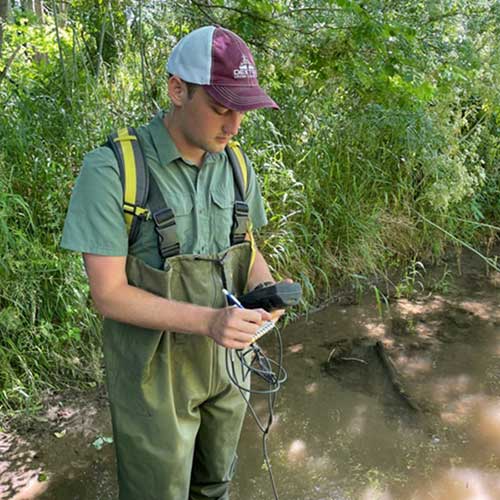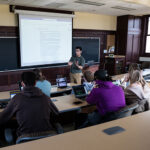
Biology major puts techniques into practice at Wilderness Center

Grant Sprague ’22, a biology major and environmental studies minor, who is also on the cross country and track & field teams interned at The Wilderness Center, a non-profit organization focused on land conservation and environmental education in Wilmot, Ohio.
Tell us a bit about your internship and what you’re doing at The Wilderness Center?
I am focusing on the results of a stream restoration project that occurred in 2016 and monitoring its effects on the surrounding ecosystem. I am primarily collecting data on the fish communities present in the stream and comparing these to a study that was conducted prior to the restoration project.
How did you find out about this internship at The Wilderness Center?
I was connected to The Wilderness Center by Dr. Jennifer Ison’s conservation biology lab. For this lab, my group was assigned to work with The Wilderness Center to evaluate the stream restoration project. I was very interested after completing this class and emailed the project supervisor asking if there was any way I could continue to help over the summer.
Tell us a bit about what resources you used at The College of Wooster to help you secure this internship?
This is an unpaid internship and would not have been possible without the help of my APEX Fellowship.
Walk us through a normal day?
I start each day in the main office at the center’s interpretive building. While there, I discuss my plans for the day with my supervisor and gather the supplies I plan on using during the day. I then go into the field and collect minnow traps that were deployed the day before, catch fish using nets, and collect water data such as temperature, dissolved oxygen content, and conductivity. After completing these surveys, I help other staff with various tasks around the property until my day is done.
Share some examples of some bigger projects you’ve been part of during your internship?
The biggest project I am participating in is the monitoring of the stream restoration project that occurred in 2016. The data that I collect will help determine the health of the surrounding ecosystem, and the success of the restoration project as a whole.
Is there anything from your studies at Wooster that you were able to apply to your work this summer?
One class that’s helped me a lot with this internship is Dr. Richard Lehtinen’s Natural History of Vertebrates. This taught me how to identify many of the species present in the stream, as well as familiarized me with the techniques I am using.
By the end of your internship what are you hoping to accomplish and take away from your time spent there?
I am hoping that my work will help The Wilderness Center measure the success of their stream restoration project, and that my data will be helpful in justifying future restoration work. Additionally, I am hoping that this opportunity will help guide my future career path, and that this experience will help me get started in this field.
Posted in Experiential Learning on August 8, 2021.
Related Posts
Related Areas of Study
Biology
Explore molecular and cellular biology, ecology and more with top faculty and access to extensive lab facilities.
Major Minor

